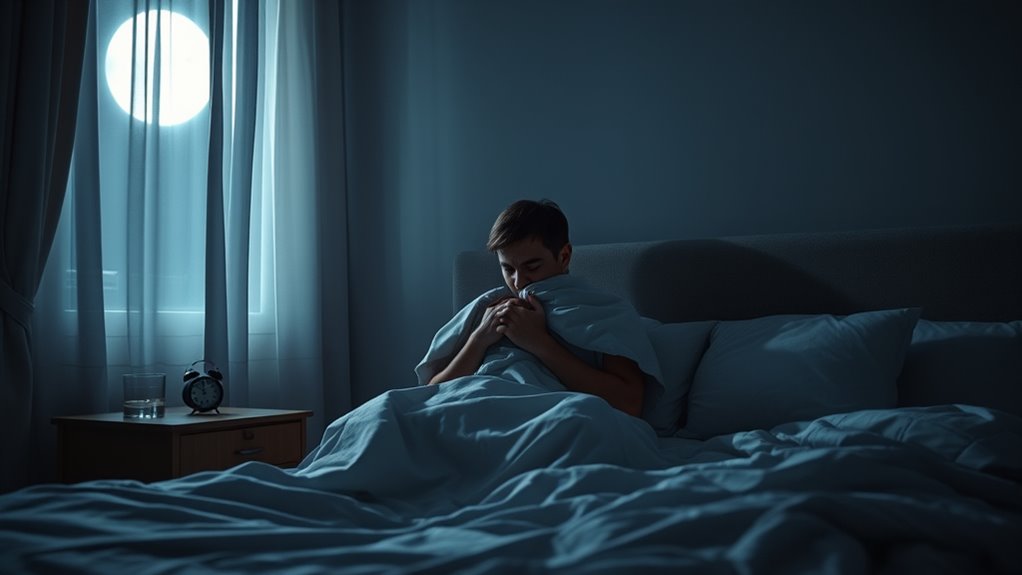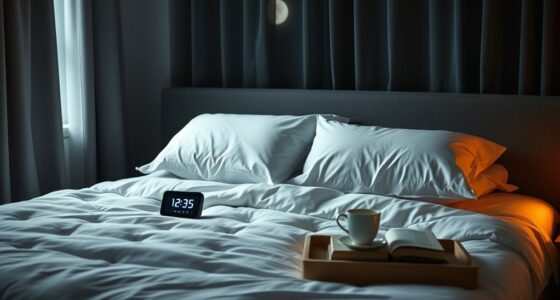Sleep anxiety makes it tough to fall asleep because your mind races with worries. It often turns bedtime into a stressful experience, creating a cycle of insomnia and alertness. To overcome this, establish a calming routine, create a comfortable sleep environment, and address your worries with relaxation techniques. Patience and consistency are key, and with ongoing effort, you can reframe your sleep habits and find restful nights. Keep exploring to learn more helpful strategies.
Key Takeaways
- Sleep anxiety involves worry or racing thoughts that make falling asleep difficult, creating a cycle of insomnia and heightened alertness.
- Establishing a consistent, calming bedtime routine signals your brain to prepare for sleep and reduces stress.
- Optimizing your sleep environment—cool, dark, quiet, and comfortable—helps promote relaxation and ease anxiety.
- Techniques like journaling, deep breathing, and progressive muscle relaxation can help manage worries and calm the mind.
- Patience and repeated practice of sleep-friendly habits gradually weaken sleep anxiety, leading to more restful nights.

Have you ever found yourself lying awake at night, unable to quiet your racing thoughts or stop worrying about falling asleep? If so, you’re not alone. Sleep anxiety can turn bedtime into a stressful experience, making it even harder to drift off. One of the most effective ways to combat this is by establishing a calming bedtime routine. Consistency is key; by creating a predictable sequence of relaxing activities before bed, you send a signal to your brain that it’s time to wind down. This might include reading a book, gentle stretching, or practicing deep breathing. Avoid screens during this time, as the blue light emitted by phones and tablets can interfere with your sleep hormones and increase alertness. Instead, focus on quiet, soothing activities that help your mind and body transition into rest mode.
Establish a calming bedtime routine to signal your brain it’s time to relax and improve sleep quality.
Equally important is optimizing your sleep environment. Your sleeping space should be a sanctuary free of distractions and stressors. Keep your bedroom cool, dark, and quiet to promote better sleep. Blackout curtains or an eye mask can block out light, while earplugs or a white noise machine can mask disruptive sounds. Remove clutter and ensure your bed is comfortable with supportive pillows and a good mattress. A clutter-free, inviting sleep space can reduce anxiety about sleep itself, making it easier to relax when it’s time to rest. Additionally, creating a calming sleep environment that minimizes exposure to potential stressors can further enhance your ability to fall asleep peacefully.
In addition to establishing a bedtime routine and refining your sleep environment, it’s essential to address the worries that fuel sleep anxiety. If your mind races with concerns or to-do lists, try journaling before bed. Writing down your thoughts can clear your mind and prevent rumination once you’re under the covers. Incorporate relaxation techniques such as progressive muscle relaxation or guided imagery to ease tension and redirect your focus away from anxious thoughts. Remember, the goal is to associate your sleep environment with calmness and safety, not stress.
Finally, consistency and patience are indispensable. Sleep anxiety often doesn’t disappear overnight, but with deliberate effort, you can reshape your bedtime habits and environment. Over time, your body and mind will learn to associate your sleep space with relaxation rather than worry. By creating a calming bedtime routine and optimizing your sleep environment, you give yourself the best chance to overcome sleep anxiety and enjoy restful, restorative sleep night after night.
Frequently Asked Questions
Can Sleep Anxiety Be a Sign of a Deeper Mental Health Issue?
Think of sleep anxiety as your body’s gentle whisper that something deeper might be going on. It can be a sign of underlying issues in your mental health, signaling stress or emotional struggles. If your sleep worries persist, it’s wise to explore these deeper layers with a mental health professional. Addressing underlying issues can help you find restful nights and improve your overall well-being.
Are There Specific Environments That Worsen Sleep Anxiety?
Yes, certain bedroom environments can worsen your sleep anxiety. Bright or harsh bedroom lighting can make it harder to relax, while cluttered or noisy spaces increase stress levels. To improve your sleep, keep your bedroom calm, dark, and cool. Using blackout curtains and dim lighting helps signal to your body that it’s time to wind down, creating a more soothing environment that reduces anxiety and promotes better sleep.
How Does Sleep Anxiety Affect Overall Physical Health?
Sleep anxiety can seriously impact your physical health by weakening your immune system and increasing stress levels. When you struggle to fall asleep, your body releases more cortisol, which can lead to inflammation and other health issues. Over time, this stress hampers your immune response, making you more vulnerable to illnesses. Addressing sleep anxiety helps restore your physical health and strengthens your immune system, promoting overall well-being.
Can Sleep Anxiety Be Inherited or Passed Down Genetically?
You might think sleep anxiety is purely caused by your environment, but genetic predisposition and familial patterns also play a role. While it’s not directly inherited, a family history of anxiety or sleep issues can increase your risk. So, if relatives struggle with sleep anxiety, you’re more likely to experience it too. Recognizing this helps you take proactive steps, like managing stress, to break the cycle and improve your sleep.
What Are the Long-Term Consequences of Untreated Sleep Anxiety?
If you ignore sleep anxiety, it can lead to serious long-term issues like chronic sleep deprivation and persistent daytime fatigue. Over time, this can weaken your immune system, impair your memory, and increase your risk for heart disease. Sleep deprivation also affects your mood and concentration, making daily tasks harder. Addressing sleep anxiety early helps prevent these consequences, so don’t hesitate to seek solutions to improve your sleep quality.
Conclusion
By recognizing sleep anxiety, you’re taking the first step toward reclaiming peaceful nights. Remember, even in the depths of night’s darkness, the dawn of restful sleep awaits, much like a phoenix rising from ashes. You hold the power to break free from worry and embrace serenity. Trust in your ability to overcome, and soon you’ll find that sweet, restorative sleep is within your reach, shining brightly just beyond your fears.








